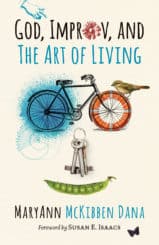
Entertain a conversation on the “will of God,” and you will most likely find yourself discussing sovereignty, omniscience, and the immutability of God. Wade a little deeper into the discussion and invariably talk of “God’s will” shifts to discovering God’s particular Plan for one’s life. The idea that God has a capital-P Plan for every child of God is reinforced by the oft-quoted verse:
“For I know the plans I have for you,” declares the Lord, “plans to prosper you and not to harm you; plans to give you hope and a future.”
~ Jeremiah 29:11
Into this view of an immutable, immovable, certain God who has specific, pre-set, static plans for his people, MaryAnn McKibben Dana offers a fresh vision in her book, God, Improv, and the Art of Living.
A Presbyterian pastor with a passion for improv, and an equally keen facility for storytelling, MaryAnn disrupts the view that life holds one best Plan A and our job is to get on the train headed in its direction, lest we risk derailing and veering off track to Plan B—or, God forbid, Plan C or D or Z. Drawing on her years of training and performance in improv, MaryAnn organizes God, Improv, and the Art of Living around the principles of improv as she writes.
The opening introduces readers to two central themes the book will address:
- How do we become flexible enough to adjust to life’s surprises and even embrace them?
- Does God ordain the various events in our lives, and does everything happen for a reason?
The first question examines how we respond to life’s uncertainties, while the second asks us to ponder the deeper theological question of the “will of God.”
In the book’s first section, readers are invited to re-imagine the commonly held view of the static will of God, with examples from scripture of a God who changes his mind. MaryAnn cites Abraham, who bargains with God to withhold punishment on the cities of Sodom and Gomorrah if God could find ten righteous people living there. She references Moses’ arguments with God to dissuade him from annihilating his people over the situation with the golden calf. And her conclusion? “Rather than being remote and impersonal, God’s nature is to collaborate—to improvise—with God’s people.”
…readers are invited to re-imagine the commonly held view of the static will of God, with examples from scripture of a God who changes his mind.
MaryAnn draws short of explaining the difference between God’s general will and his specific will, as that’s not the overall purpose of this book. But her words sing of the importance of holding loosely to the idea of a detailed playbook for the life of every follower of God. Referencing accounts from the New Testament as well, MaryAnn offers the example of Jesus’ first miracle as another occasion when the Godhead seems to have had a change of mind. In the obscure town of Cana, Jesus offers an extravagant “Yes” when he “restock(s) the bar at a wedding,” after giving an initial “No” to his mother’s first request for aid. This picture of a relenting Jesus forces us to revisit some of the notions we have of an immovable God.
I read these first pages with great excitement for what was to follow, as I myself have been prone to envision a God with a very specific plan for my life—if I could only figure out how to decipher it. The opening section of the book builds on Susan E. Isaacs’ provocative question, quoted in the foreword: “What if God is asking us the question: “What do you want?” It’s a terrifying and freeing invitation.”
Reading God, Improv, and the Art of Living, I was hanging on the author’s every word, waiting to see where she would go theologically in her analysis of the static versus dynamic will of God. Expecting a continued unpacking of her vision of an improvisational God before turning to an analysis of how we might live more improvisational lives, I was surprised to discover MaryAnn diving immediately into the theme of living an improvised life. Ironically, I found myself needing to apply the first principle of improv—to Say Yes to what she offered me, and to trust that in showing me how to live an improvised life I would come to understand that God relates to us in an improvisational way as well.
The book brims with fascinating stories from a wide range of topics including improv, science, sports, medicine, history, business, music, and more. The author weaves these narratives throughout, keeping the reader committed and engaged. God, Improv, and the Art of Living is a joy to read. The exercises at the end—both for individual reflection and for group improv play—reinforce the principles the author is teaching and help the reader identify where s/he is not living an improvised life.
MaryAnn begins to pull everything together in Principle Six—Live More Deeply, which serves as a great crescendo before the final section. She addresses our resistance when faced with something new, and asserts that this resistance is indicative of our fear of mystery: “These sentiments (“You’re not good enough” and “Who do you think you are?”) stop us mid-risk and keep us safe on the beaten path rather than in the improvisational mystery, which is scarier, but ultimately more interesting and satisfying.”
To live in the mystery is to live an improvised life.
To live in the mystery is to live an improvised life. Improvising, says MaryAnn, involves taking risks and living creatively. It requires active listening and careful attention. It means failure is not a dead-end, just a step on the journey to the next step, which we must take, even if we don’t know where it will lead. To live an improvised life is to live fully present and authentic lives, embracing hope, redemption, and God’s gifts of grace.
Whether on stage or on the page, MaryAnn is an astute storyteller, as she leads us to the beautiful observation that an improvised life is the true life of faith—and as such, it is not intended to be comfortable or predictable. To embrace the ambiguity of life is to live life without the certainty of knowing where it will lead.
When I could stand the suspense no longer, MaryAnn returned with greater intensity to a more thorough treatment of the theology of an improvising God. Citing the fact that God doesn’t answer Job’s questions regarding his suffering, she confides, “I want a God who’s reliable, who’s going to respond in ways I can predict. As far as I can tell, though, that kind of God doesn’t exist.”
We humans always seek to decipher meaning out of the events of our lives, but God, Improv, and the Art of Living reminds us that if God’s ways are mysterious, then we too must be willing to live in the mystery. This is our improv response to life.
Coming full circle, MaryAnn asserts that it can be frightening to accept that there’s not one specific plan for us to follow, because it opens up many options for us to sift through. But, she reminds us, it is also more liberating, because it frees us from the anxiety of getting it wrong. And that sounds just about right, coming from a God who is a “love-oriented, collaborative, relational, improvising God.”
A former banker, Bonnie O’Neil spends more time these days with words than with numbers. Her first book is titled My Identity is in Christ, and she writes regularly on her blog This is the Day. Bonnie is an engaging retreat and conference speaker, and she teaches a weekly Bible study at her home church. When not at her desk writing, she can be found raising funds for research to cure type 1 diabetes.


One Response